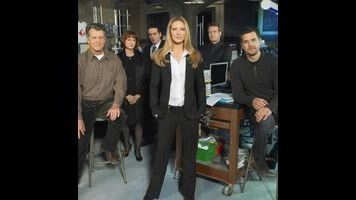Fringe: "Pilot"

Premieres tonight on Fox, 8:00 p.m. ET
Note: This review reveals minor details about the plot of tonight's episode, though none of its major twists; nevertheless, the spoiler-averse may want to wait until after the episode airs before reading.
There's a certain amount of getting-to-know-you involved with any new TV series, but especially one with as strong a geek pedigree and long-term potential as Fringe, the latest endeavor in cult-currying from J.J. Abrams. Abrams is known for helping create Alias and Lost–shows that contain secrets within secrets–and even though he's promised that Fringe is going to be more "drop-in friendly" than his more continuity-heavy efforts, the extended-length Fringe pilot hints at a vast universe of corporate criminals, mad scientists, and supernatural phenomena that could take years to fully map out, even if Abrams and company explore it via one weekly mystery at a time. And frankly, the pilot episode, while often highly entertaining–funny at times, creepy at times, and with a liberal dose of what-the-hell?–is more straightforward and plain than Alias or Lost's first episodes were. Fans of sci-fi adventure may find themselves finishing the first Fringe with their fingers crossed, hoping the show gets to run long enough to become all it can.
Let's start with the good, because Fringe certainly does. Not since Lost has there been an opening scene in a pilot as immediately arresting as Fringe's introduction of airplane rocked by an electrical storm, a man having a panic attack, and an airborne contagion that causes everyone near the man to start shedding their skins. Soon the crew's jaws are falling off, though not before they can switch the jet over to autopilot, so that when the flight arrives in Boston (landing by remote control), everyone on board has been reduced to blood-spattered skeletons.
There's one man who can unravel the secret of what happened on that plane. His name is Walter Bishop, and as played by John Noble he's a raving madman who speaks in non-sequiturs and concocts crazy schemes that implausibly prove effective. For example: When FBI agent Olivia Dunham (played by Anna Torv) is trying to find a way to save her infected partner John Scott (Mark Valley), Walter suggests that Agent Dunham drop acid, strip to her underwear, insert electrodes in the base of her skull, then submerge herself in a sensory deprivation tank to see if she can communicate with Agent Scott subconsciously.
Dunham's pursuit of the bad guy also leads to the mysterious research organization Massive Dynamics (slogan: "What Do We Do? What Don't We Do!") and to company figurehead Nina Sharp (Blair Brown), who sports a cybernetic arm and a generally unhelpful attitude. Her main function seems to be to block access to William Bell, the founder of MD, who used to work alongside Walter Bishop back in their Harvard days. While Walter went crazy; his old friend became the head of a multi-trillion dollar company, behind every major technological advancement of the age.
Here's the problem with the Fringe pilot: It isn't really about these two old scientists and their divergent paths. (At least not completely.) It's about Dunham's step-by-step descent into this world of supernatural mystery, which is described by her boss Philip Broyles (Lance Reddick) as "The Pattern." Walter Bishop may have gone nuts studying the connections between "mind control, teleportation… reanimation," but he's Dunham's key to mapping out The Pattern, and her key to unlocking Walter is his son, Peter (Joshua Jackson), a reluctant genius who skates by as a con artist. Judging by the first episode, Fringe is going to be about the partnership of Olivia and Peter, as they enter a world neither of them wants to be in, while swapping flatly functional dialogue out of a dime store pulp.
Both Joshua Jackson and Anna Torv are fine as the leads, and there's a strong chance that they'll grow into these roles and develop more nuanced personalities than "driven professional woman with soft heart" and "hardened cynic with baby face." For now though, Fringe will probably rise or fall based on the strength of each week's unexplained phenomenon, and the quirks of the mythology and supporting characters. The pilot has a solid story with a few good twists (which I won't go into here, though feel free to discuss them in the comments section after the episode airs), but its mythology is still nascent.
Those supporting characters though? Well, that's where Fringe really kicks in. Noble in particular sells Walter Bishop's precise mix of crazy, smart, funny and scary, whether he's muttering about the menu at his mental institution ("They have this horrible… pudding here.") or ordering up a cow for his new lab, or holding a scalpel in his shaky hand, preparing to cut into Agent Scott before anyone's given him the okay. There's a strong touch of tragedy to the character, and yet he's also the most entertaining person on the screen. I'm looking forward to seeing more of him.
 Keep scrolling for more great stories.
Keep scrolling for more great stories.
